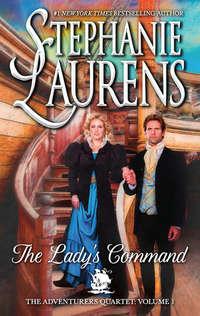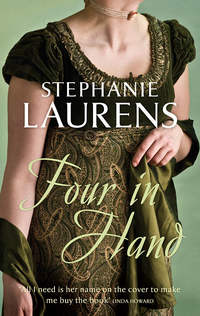
Полная версия
The Designs Of Lord Randolph Cavanaugh: #1 New York Times bestselling author Stephanie Laurens returns with an uputdownable new historical romance
Flora had heard his name when he’d introduced himself; as soon as she’d caught her breath, rather than join Felicia, Cavanaugh, and William John in the drawing room, Flora had rushed upstairs and combed through her correspondence.
Flora’s correspondents numbered in the multiple dozens, all ladies like herself for whom keeping abreast of everything to do with the haut ton was a lifelong occupation.
Courtesy of Flora, Felicia now knew that Lord Randolph Cavanaugh was the second son of the late Marquess of Raventhorne and was wealthy and eligible in every way—no real surprise there—but to the consternation of the grandes dames, Lord Randolph tended to avoid the ballrooms and, consequently, was as yet unmarried. That, she had to admit, was surprising and had raised a question—purely a curious one—in her mind. What would it take in a lady to interest Lord Randolph Cavanaugh?
The object of her purely idle curiosity reached the entrance to the rose garden. From the corner of her eye, she watched as, his gaze fixed on her, he ducked beneath the archway and slowed to a prowl. He pretended to glance at the roses, then, as he halted a yard away, returned his gaze to her.
She really did not like the way her nerves were tightening in response to his focused look. Before he could speak, she briefly glanced his way. “We keep country hours. Dinner will be served at six o’clock.”
One of his dark brows faintly arched. “So I’ve been informed.”
His voice was deep, a purring rumble.
Lips and chin firming, she reached for another rose hip. Anything to force herself to look away from him—to give herself a reason for doing so. Admittedly, in the drawing room, he’d almost flabbergasted her by asking her opinion—asking for her agreement in forging on as they were—yet she wasn’t at all sure that had she disagreed, he wouldn’t simply have ignored her stance.
Gentlemen like him might well possess ingrained manners and act on them without thinking. That didn’t mean he’d actually cared about how she felt, and she would be a fool to further encourage him.
Snip.
“I saw you out here and thought I’d get some air—and kill two birds with one stone.”
Inside, she stiffened. Air she understood, but what else was he thinking to slay?
When he didn’t immediately offer up a clue, her wits—unaccountably skittering in myriad directions though they were—came up with the answer. She debated for only a second; better she keep the reins of any conversation in her hands, and she stood to learn as much about him from his questions as he stood to learn from any answers she deigned to give. Pausing in her pruning, she slanted him a glance. “What do you wish to know?”
A faint smile edged his lips—and her eyes and her senses found another point of distraction. Luckily, he’d relaxed somewhat and, thrusting his hands into his pockets, he glanced down as if marshaling his words.
Rand had looked down to hide his satisfied smile. Her response to his vague allusion confirmed his initial assessment that Miss Throgmorton was a lady of uncommon intelligence. That was hardly surprising given she was William Throgmorton’s daughter, but it was one of the points he’d wanted to verify. Her being intelligent would make working alongside her in managing William John and the completion of the steam engine a great deal easier.
Regardless, he took a second or two to consider his next words. She was...prickly. Somewhat unaccountably, and the reason for that was a part of what he needed to learn. He drew breath and, without looking up, said, “Forgive me if I misread, but during our meeting in the drawing room earlier, I got the impression that you were...shall we say, opposed to inventions? Whether specifically your father’s and brother’s or in a more general sense, I couldn’t tell.” He looked up and met her green eyes—summer green, the soft green of summer grass. “However, given the present circumstances, I’m curious as to your attitude, and why you seem to have taken against inventions.”
And if, therefore, you’re going to get in my way. Mine, my investors’, and William John’s.
He didn’t say the words, but as her eyes narrowed on his, he felt confident she understood.
She stood with her shears held laxly in one gloved hand and stared into his eyes. Then her lips firmed, and she turned back to the rose bushes. “I am not against inventions.” She reached for a dead rose. “It’s inventors I have little sympathy or time for.”
She paused, the fingers of one hand cradling the withered bloom; her shears remained raised, but didn’t sweep in. He could almost hear her debating whether or not to explain her stance to him. He knew when she accepted that, given the circumstances, he had reason to ask and, possibly, a right to know.
“There’s a truth I learned long ago.” Her tone had hardened; her diction was clipped. “When it comes to anything that impacts on their inventing, inventors like my father and my brother are inherently, innately selfish. They live and breathe their work and are deaf and blind to all else about them—to house, estate, staff, friends, family. Everything. Were the house to literally crumble about them, they wouldn’t notice—would pay it no heed whatever—not unless and until it directly interfered with their work. Only then would an issue other than the invention itself become important—important enough for them to afford it an iota of their attention.”
Now that Felicia had finally faced the question no one before had ever thought to ask her, and had started to answer and, in doing so, had opened the box into which for so many years she’d stuffed all her resentments, she discovered that continuing was easier than curbing her tongue. “I saw what my father’s unswerving devotion to his inventions meant for my mother. She was a Walpole, higher born than Papa, but theirs was a love match—and of that I am sure, that there was love on both sides to the very end. Yet my father’s inventions always came first. Throughout all my mother’s life, Papa’s inventions kept eating up all their funds, leaving Mama cut off from society—even the small circle of local society. She couldn’t entertain, sometimes not for years. People were kind, but she wouldn’t attend dinners on her own, and Papa would never make the time to accompany her. For years, we lived under the most straitened circumstances, with Mama’s constant role being to pinch and scrape and eke out the funds left after Papa’s depredations, just to keep up appearances and make sure there was food on the table. Not that Papa or William John ever noticed what they were eating. Our staff, bless them, have stuck with us through thick and thin, but through most of my parents’ marriage, times were far more thin than thick.”
Cavanaugh shifted. “Your father is considered a very successful inventor. I know he had many successes.”
She made a scoffing sound. “He did, indeed, but, monetarily speaking, virtually all his successes were minor. All brought in some funds, but it was never enough to cover my father’s—and more recently, William John’s—hunger for the latest valve or piston or cylinder or gear. There’s always something they simply must have. The drain on our funds was—and still is—never ending.”
She sensed rather than saw him lift his head and glance around—at the well-maintained house, the grounds, the gardens.
“Yet you seem to have managed well enough.”
She laughed cynically. “Up to now.” She paused, then in a quieter tone went on, “I saw what inventions made of my mother’s life. I learned that the obsession with inventions isn’t something even love can triumph against. When she fell ill, at her request I took up the reins of managing the household. Unlike Mama, I have a good head for numbers—and I was more than up to the task of arguing and nagging my father until he agreed to set aside funds for keeping up the house. Mama died eight years ago. Papa’s successes mostly occurred after that, and I managed to cling to sufficient funds to keep the good ship Throgmorton on an even keel.” She paused, then snipped another dead rose. “At least, so I thought.”
After a moment, she turned, dropped the dead rose into her basket, then raised her gaze and met Cavanaugh’s eyes. “I might as well confess that I hold a deep and abiding antipathy toward inventing—the process. Had I known how matters stood, if it had been up to me, after Papa died, I would have drawn a line under the steam engine project and returned the unused funds to you and your syndicate.” She paused, then inclined her head and swung back and shifted to face the next rose bush. “That said, I know William John wouldn’t have agreed, and quite aside from being male, he’s also older than me.” She cut another dead rose and more evenly said, “In addition to the reasons he gave—of wanting to establish himself—I suspect he feels a certain filial obligation to get the engine working as my father envisaged as a form of tribute to Papa—a final triumph.”
His gaze fixed on her profile, Rand murmured, “I can understand that.”
“It might be understandable, but is it sensible?” She snipped another rose, resurgent tension investing the movement.
Before Rand could formulate any answer, she shot a sharp glance—one a very small step away from a glare—his way. “After Papa’s death, the only reason I gave way and acquiesced to William John continuing to work on the steam engine project was because there was money still coming in—as I thought, from royalties from earlier inventions.”
She turned back to the bush; he could only see her profile, but even that looked flinty. The next dead rose fell to a savage slice of her shears.
“Both Papa and William John lied to me about the source of those funds. They didn’t just encourage me to believe something that wasn’t true—they lied. Directly. Several times each. They intentionally deceived me”—Rand almost winced as she took off another dead rose—“so that I would think there was enough money—sufficient money, at least—to be made from inventions after all. They bought my support with lies.”
Rand suddenly found himself skewered with a green gaze that was all daggers.
“You can imagine how I feel about that.”
He could.
“And”—she turned back to the rose bushes—“how I therefore feel about everything to do with inventors and inventing.”
He’d wanted to know, and now, he did. Rand looked down, studying the edge of the flagstone path while he absorbed all he’d heard, all he’d sensed behind her words, and readjusted his strategy.
He knew too many inventors to doubt anything she’d said. The emotional and physical neglect she’d described wasn’t uncommon but an all-too-frequent outcome of inventors’ single-minded focus on their works.
As for her hurt on learning she’d been lied to... He knew all about betrayal by one’s nearest and dearest, those a man—or a woman—should have been able to trust.
The realization left him feeling a closer kinship with her than he’d foreseen.
Unfortunately, he could do nothing about what lay in her past, any more than he could do anything about what lay in his.
Experience had taught him that forward was the only practical way to go.
He raised his head, studied her for an instant, then quietly said, “Just for the record, although I might fund inventions and intend to work alongside your brother in bringing his current project to fruition, I would definitely notice if the house started to crumble in even a minor way.”
She glanced at him sidelong and briefly met his eyes. “You’re an investor, not an inventor.”
He smiled tightly. “Indeed.” He didn’t want her tarring him with that brush.
She gave a small humph and turned back to snip another dead rose.
Rand studied her face, the flawless complexion—milk and honey with a golden tinge courtesy of the summer sun—framed by a wealth of tumbling red-gold locks that made his fingers itch.
And I would definitely notice if you were unhappy or distressed or under pressure of any sort, especially if it was due to something I’d done.
The words remained a quiet statement in his mind; he was too wise to utter them.
He straightened and caught the swift glance she threw his way. “Thank you for confiding in me.” He held her gaze. “I can’t promise that this will pan out as we all hope, but rest assured I will do everything I can to ensure the weight of your father’s last invention is lifted from you, your family, and the household as soon as possible.”
Openly, she searched his eyes. “Do you think it’s possible? That at this late stage, William John can sort out the mechanisms that to date have eluded him?”
He didn’t look away. “I can’t say. However, I can guarantee that our only option is to forge ahead and do everything possible to assist William John in that endeavor.”
She looked toward the house. For a moment, he thought she would merely nod in dismissal, but, instead, she raised her chin and said, “Thank you for the assurance of your support.” She paused, then went on, “While I might not be overjoyed about the project continuing, I understand the situation and accept that it must. That, as matters stand, we all need this invention to be a success.” Finally, her eyes touched his again, and she gracefully inclined her head. “Rest assured that I’ll do nothing to make the road to success more difficult.”
Rand tipped his head in response. “Thank you.” That was the assurance he’d come to the rose garden hoping to get. He stepped back. “I’ll see you at dinner.”
She murmured an agreement and returned to trimming the roses.
Rand turned and walked out of the rose garden, then he slid his hands into his pockets and strode across the lawn. On his way to the rose garden, he’d passed the still-open doors of the workshop; a breeze had sprung up, and the sulfurous fog had almost cleared. He turned his steps west. Circling the house would afford him time to sort through his thoughts as well as giving him the lie of the land.
Speaking of which, he should learn Miss Throgmorton’s given name. Not that he expected to get all that much closer to her, fascinating creature though she was. She was intelligent, prickly, and capable—more than clever enough to manipulate any man.
Precisely the sort of clever lady he’d long ago barricaded his heart against.
And if his heart wasn’t involved...given the circumstances, pursuing any sort of relationship with her was entirely out of bounds.
Yes, he was aware of the visceral tug he felt in her presence, but that didn’t mean he had to do anything about it.
Aside from all else, he was there, walking the lawns of Throgmorton Hall, for one burningly urgent reason. He had to ensure the Throgmorton Steam-Powered Horseless Carriage made its debut in appropriate style at the upcoming exhibition.
If he failed...
Unlike the Throgmortons, he wouldn’t be ruined, but the setback would be severe.
Clearly, he and William John would get no active help from Miss Throgmorton, not that he could imagine how she might actively assist. But she’d agreed to manage the household around them, around the completion of the invention, and that was really all he could hope for from her.
He walked on, boots crunching on the gravel of the forecourt as he approached the front door, through which he’d left the house.
As he started up the porch steps, he inwardly admitted he would have preferred Miss Throgmorton to be more engaged with the project—to be an invested supporter, rather than a highly reluctant one.
But he’d gained a clear statement of commitment, and having heard the reasons behind her attitude to inventing, that was realistically all he could hope for.
It’s enough to go on with. The words rang in his mind as he opened the door and walked into the front hall.
CHAPTER 3
Felicia swept through the door of the breakfast parlor at her customary hour of eight o’clock. Dinner the previous evening had been an entirely uneventful and rather stiff affair; she’d still been grappling with the ramifications of the revelations Cavanaugh’s arrival had brought, William John had been frowning and muttering over what had caused the explosion, and Cavanaugh had seemed disinclined to push further regarding the invention, perhaps wanting to wait until he’d seen it. He’d spent more time chatting with Flora than with anyone else.
As usual, Felicia found William John already at the table, frowning direfully at several diagrams while he sipped his coffee, but she nearly jumped when Cavanaugh rose from his chair farther around the circular table.
Her eyes wider than she would have liked, she managed to smile with reasonable composure and wave him back to his chair. “Good morning, my lord.” I didn’t expect to see you before noon. “I trust you slept well?” She headed for the sideboard.
“I did, thank you.” He resumed his seat. “The bed was comfortable, and after the constant noise of the capital, the silence of the country at night is a welcome relief.”
She glanced briefly his way. “You live in Mayfair?” Why had she asked that? She didn’t need to know. She gave him her back and concentrated on helping herself to a portion of kedgeree—and tried to drag her wits away from their sudden obsession with whether her bodice was straight and her hair properly pinned.
“I have lodgings in Jermyn Street.”
Of course he did. The street inhabited by all the most fashionable bachelors.
“That said, I spend most of my time in my office in the City.”
Turning, she approached the place opposite him. Johnson arrived with a teapot and a fresh rack of toast; he quickly set them down and pulled out and held her chair for her. She thanked him with a smile, sat, then glanced again at Cavanaugh. “I suppose you have to meet and discuss projects with your investors.”
He lowered his gaze to his plate of ham and eggs. “That, and meet with my contacts so that I hear of any new inventions looking for funding.” He raised his gaze and, across the table, met her eyes. “That takes more hours than I like, but it’s essential to keep on top of the field. Inventions arise more or less unheralded—one has to keep one’s ear to the ground.”
She nodded and, fixing her gaze on her plate, sampled the kedgeree, then settled to consume it. To her irritation, she was keenly aware of her every movement. Was there a bit of herring on her lip? She must be careful not to overload her fork.
Such thoughts—such awareness of her appearance and how a gentleman might be seeing her—were so alien, they jarred.
What was the matter with her?
Whatever it was—whatever affliction Cavanaugh had inflicted on her—she needed to ignore it.
Feeling his gaze on her, she very nearly squirmed.
“You know,” William John said, “I think you’re correct.” He leaned across to show Cavanaugh a diagram. “If I move the inlet valve to here, then the gauge should be more sensitive to the changes in pressure.” William John frowned. “Theoretically, anyway.”
Cavanaugh shrugged. “At times, one simply has to try things and see if they work.”
Slowly, still frowning, William John nodded. “Once we have the workshop cleared and the boiler replaced, we’ll try it. That, however, won’t be the only change we’ll need to make.”
Accustomed to her brother’s ramblings, Felicia, nevertheless, pricked up her ears at his use of “we.” Ever since their father’s death, with respect to the steam engine, William John had always spoken in the singular.
She continued to eat her kedgeree and sip her tea, and surreptitiously watched as Cavanaugh made another suggestion, and William John readily discussed the pros and cons...freely, without the slightest reservation.
In less than twenty-four hours, Cavanaugh had won her brother’s confidence, something she knew was not easy to do.
Clearly, she would be wise not to make assumptions about Lord Randolph Cavanaugh. It wasn’t yet nine o’clock, and already, he’d surprised her twice.
She was surprised again when Cavanaugh turned to her and asked if William John’s proposal to commandeer the footmen and gardener for cleanup duties in the workshop would inconvenience her.
She was tempted to say it would, but she’d promised to assist as she and the household could. She shook her head. “There’s nothing on their plates this morning that they can’t do later, once they’ve finished in the workshop.”
Cavanaugh turned back to William John and continued—artfully, gently, almost imperceptibly—to steer her brother, again and again drawing his peripatetic mind back to the issue at hand and keeping him firmly on the shortest path to completing the necessary modifications to the engine.
Felicia had to be grateful for that; if left to himself, William John had a tendency to follow whatever vague notion popped into his brain. From comments he’d let fall, she’d long ago formed the opinion that her brother’s brain was literally awhirl with thoughts, even more so than their father’s had been.
Now Cavanaugh had won William John’s trust, Cavanaugh was in a position to harness William John’s undoubtedly able mind and keep it focused on fixing the engine.
Watching the pair, for the first time since learning of the true nature of what faced them all, she felt a smidgen of hope.
With Cavanaugh at the helm, they might just win through.
Finally, William John slapped his palm on his pile of diagrams. “Right, then!” He looked at Felicia for the first time since she’d entered the room and grinned. “It’s time we got working.”
The enthusiasm in his eyes...she hadn’t seen that for quite some time. She found herself smiling back, then she set down her empty teacup, pushed back her chair, and rose as both men came to their feet.
She turned and made for the door; she had her usual morning meeting with Mrs. Reilly, the housekeeper, to attend, then she needed to take stock of the kitchen garden with Cook and decide if they should try for another crop of peas.
Cavanaugh and William John followed her into the front hall. William John made straight for the door to the workshop stairs, but Cavanaugh hesitated. When, heading for her sitting room on the other side of the hall, she glanced his way, he caught her eye. “Don’t you want to see how things are in the workshop?”
She slowed, her gaze steady on his. “No. I don’t go down there. I haven’t been down since I was twelve years old.”
His eyes narrowed, as if he sensed there was some tale behind that.
She summoned an entirely meaningless smile, turned, and walked on.
Rand watched the fascinating—and now enigmatic—Miss Throgmorton walk to the door of the room opposite the drawing room, open the door, and disappear inside, shutting the door firmly behind her.
He shook aside the feeling of...he didn’t know what. Ridiculous to feel that, now, he needed to find out what had happened when she was twelve years old that had kept her out of her father’s workshop ever since.
With a shake of his head, he strode after William John and started down the stairs.
He had to admit that William John’s performance in the breakfast room had certainly borne out his sister’s view; William John had been utterly oblivious to her presence. He hadn’t even looked her way when Rand had asked her about the footmen.
Rand was well aware that inventors—most of them—behaved in exactly that fashion, that their minds were so blinkered they were aware of nothing beyond their invention. Yet since he’d spoken with Miss Throgmorton, his eyes had been opened to the harm that trait could cause.
There was, sadly, nothing he could do to alter or even ameliorate that.
He reached the bottom of the stairs, raised his head, and surveyed the challenge before him.
William John and the Throgmorton steam engine.
That was a challenge he could do something about.
Although the workshop doors had been closed during the night, they’d been propped open again at daybreak, and the air inside the laboratory-workshop was now fresh and clear.
Rand paused on the last stair and scanned the chamber. With no wafting cloud to obscure his view, he took in the racks and shelves that filled every available foot of wall. Every inch of storage space was crammed with cogs, tubes, pistons, valves, pipes of every conceivable sort, and a cornucopia of engine parts. Two large, moveable racks were hung with a plethora of tools. The paraphernalia for welding was piled on a large trolley.











